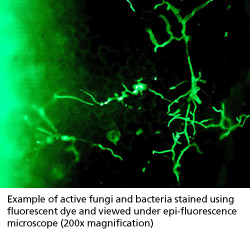Research at Mycolife – Working with Nature
Soil biology is often neglected but is critical to a healthy farming environment and quality nutrient-dense food production. At Mycolife we provide laboratory analysis and support to understand how your soil biology population dynamics are functioning.
Our lab studies the activity of different groups of beneficial micro-organisms in the soil. We provide high-quality proprietary soil health testing, firstly conceived by Dr Elaine Ingham in the USA, Canada, Australia, New Zealand, and South Africa. Implementing a biological approach has helped growers around the world to reduce their dependency on synthetic fertiliser and chemical inputs as soil biological activity (the soil food web) increase.
For more information on our microbiology services, please contact the Lab Manager on 07557 044046 or by email – lab@mycolife.uk

Why is soil life so important?
Micro-organisms perform a multitude of roles in the soil, decomposing organic matter and in doing so releasing nutrients to the plant. The activity of soil microorganisms also improves the water holding capacity and the structure of the soil which causes the soil to be more porous, allowing better root penetration, which in turn means that the plant has greater access to oxygen, nutrients, and water. The key to a more sustainable farm is maintaining a healthy balance in beneficial micro-organisms as they can also actively keep out plant pathogens and other threats to crops.

Our Promise
At Mycolife, we provide comprehensive soil tests to analyse your own soil biology. Using specialist microscopy, we perform direct counts of the different groups of soil microbes. We and industry partners have an evolving database currently consisting of several thousand results observed in soils from all over the world. By comparing your soil test result to soils where your plant or related plant species are growing in native ecosystems, we can tailor a biological program in order to correct the microbial imbalance in your soil.
The Soil Food Web Test
We offer the following biological tests for soil, compost, compost tea, and plant leaf samples:
Total Bacteria and Total Fungi
The optimal bacterial and fungal biomass in the soil varies according to crop, climate, and season. If it is not within the optimal range for soil functionality and crop performance bacteria or fungi may need to be boosted with additional biostimulants, compost, or compost tea additions.

Active Bacteria and Active Fungi
Only that percentage of the bacteria and fungi which are currently metabolising organic compounds are directly nourishing the plants; if this portion is too low, specific microbial foods may be required to stimulate the dormant population.

Protozoa
These single-celled micro-organisms feed primarily upon bacteria and in doing so, excrete nitrogen in plant-available form. A diverse protozoa population consisting of flagellates, amoeba, and ciliates are essential to healthy plant growth to effectively cycle and release nutrients to the plant.
Nematodes
An exceptionally diverse group of very small worms which are abundant in soil environments. Except for plant-parasitic nematodes, these soil dwellers predominantly help recycle nutrients by feeding on bacteria and fungi or even other nematodes. We group soil nematodes depending on their feeding habits.

Mycorrhizal colonisation
Over 90% of all plants on Earth form symbiotic relationships with mycorrhizal fungi. These fungi increase nutrient uptake (particularly phosphorus) and protect the plant against pathogens. We are able to calculate the percentage of root colonisation in crops.

Leaf Organisms
Our test determines the microbial colonisation on the leaf surface. This is particularly useful for comparing before and after compost tea applications since adequate coverage of leaf surfaces by beneficial micro-organisms can help reduce crop pests and disease.
Get in touch
For more information on our biological services please contact the Lab Manager on 07557 044046 or email lab@mycolife.uk.
